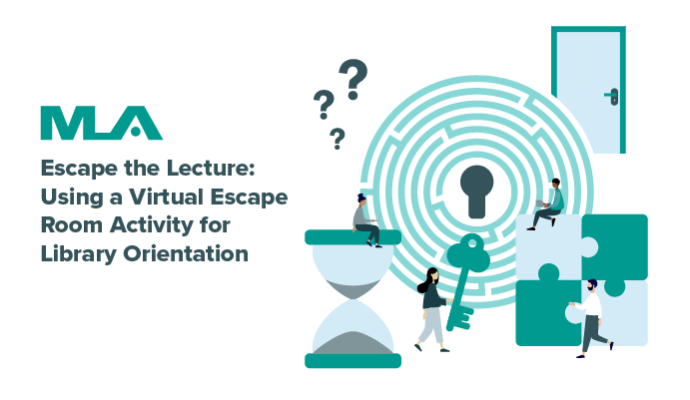This blog post was coauthored by Rozalynd P. McConnaughy, AHIP, Steven Wilson, AHIP, and Ruth A. Riley, AHIP.
This year, University of South Carolina School of Medicine Columbia librarians decided to revamp and gamify the library’s in-person lecture-style orientation session for first-year medical students. We thought the students would enjoy an interactive, competitive activity that would also give them hands-on practice searching core information resources. LibWizard from Springshare was the platform used for creating the virtual escape room, Defeat the Disinformationists!
Here is the scenario: “A group of hackers called the Disinformationists has been altering medical information in libraries across the country and the School of Medicine Library has become their next target! The librarians were able to recover some encrypted files the Disinformationists put on their server. Some of the files appear to be clues as to what resources may have been affected by their cyberattack. The librarians have been working to check the evidence-based information, but they have asked for your help to make sure that six electronic resources have not been hacked! You have forty minutes to complete the mission, or the librarians will need to shut down the server.”
The students were assigned an orientation tutorial to go through prior to the in-person orientation session. The tutorial provided an overview of the information resources they would use in the escape room. During the in-person orientation session, three librarians served as “gamemasters” to answer questions and provide hints as the 100-plus students worked through the activity. LibWizard includes a countdown timer feature, and the students had forty minutes to complete the escape room. They could work individually or in pairs.
The students had to complete six puzzles, which included a Caesar Cipher, a jigsaw puzzle, a crossword puzzle, two riddles, and a video with a code. After the student(s) solved a puzzle, they would unlock the name of the next database that they needed to search, and there was at least one multiple choice question to answer per resource. The students searched six different resources: the library catalog, AccessMedicine, ClinicalKey, PubMed, Ovid MEDLINE, and e-journals.
The final screen of the escape room included a link to an optional online survey that was designed using LibWizard to collect information about their experience. After the session, the students also received an email that day with a link to the online survey. The five-question survey asked the students to rank their skill level using library resources before and after the class. The survey also asked for open-ended feedback regarding what they liked about the session as well as problems they encountered while completing the escape room.
Forty-five students completed the survey. The majority of the students rated their skill level in using library resources as “novice” or “advanced beginner” (36/45) prior to the session. After the session, the majority of the students (44/45) rated their skill level as “competent” or “proficient.” The students were overwhelmingly positive in their open-ended feedback via the online survey. Many students appreciated the interactivity and creativity, and they described the session as “fun and engaging.” The students also encouraged us to “do this more often!”
Since the first orientation escape room, the library has developed longer virtual escape rooms for research courses using the same scenario, but different puzzles and searching questions. Based on the enthusiasm observed in the sessions and the survey results, we will continue to include virtual escape rooms during library instruction.
Want to give it a try? The escape room is available here. The answer key is provided so you can progress through it without having access to some of the databases.




